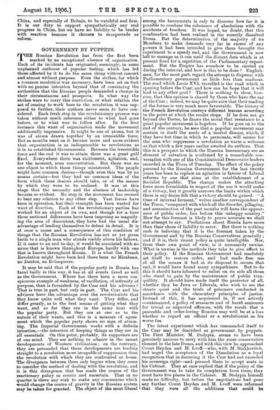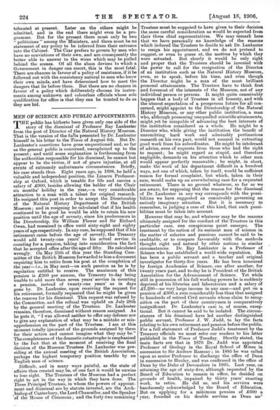GOVERNMENT BY PUPPETS. T HE Russian Revolution has from the first
been marked by an exceptional absence of organisation. Each of its incidents has originated, seemingly, in some unplanned outburst of popular feeling, which has led those affected by it to do the same thing without concert and almost without purpose. Even the strikes, for which a common resolution was necessary, have been set on foot with no precise intention beyond that of convincing the authorities that the Russian people demanded a change in their circumstances and prospects. In what way the strikes were to carry this conviction, or what relation the act of ceasing to work bore to the revolution it was sup- posed to further, their authors never seem to have con- sidered. Each fresh step in the revolutionary process was taken without much reference either to what had gone before, or to what was to follow after. In the first instance this want of organisation made the movement additionally impressive. It might be one of atoms, but it was of atoms drawn together by an irresistible force. But as months went on it became more and more evident that organisation is as indispensable to revolutions as it is to established Governments. Between the irresistible force and the end it was to attain there was a great gulf fixed. Everywhere there was excitement, agitation, and, for the moment, even concentration. But there was no one object to which these things ministered. The people might have common desires—though even this was by no means certain—but they had no common ideas of the form which these desires should take, or of the means by which they were to be realised. It was at this stage that the necessity and the absence of leadership became so evident. No step in the movement has seemed to bear any relation to any other step. Vast forces have been in operation, but their strength has been wasted for want of direction. Each of the revolutionary parties has worked for an object of its own, and though for a time these sectional differences have been imposing as magnify- ing the area of discontent, they have had the usual dis- advantage of lending themselves to defeat in detail. It is at once a cause and a consequence of this condition of things that the Russian Revolution has not as yet given birth to a single man who stands visibly above his fellows. If it came to an end to-day, it would be associated with no name that is known throughout Europe, hardly with one that is known throughout Russia. It is what the French Revolution might have been had there been no Mirabeau, no Denton, no Robespierre.
It may be said that if the popular party in Russia has fared badly in this way, it has at all events fared as well as the Government. Where has there been a more con- spicuous example of weakness, of vacillation, of infirmity of purpose, than is furnished by the Czar and his advisers ? That is true in part, but only in part. The Czar and his advisers have the advantage over the revolutionists that they know quite well what they want. They differ, and differ greatly, as to the best means of getting what they want, and so far they are in the same boat with the popular party. But they are at one as to the nature of their wants, and this is a measure of agree- ment which the popular party shows no sign of attain- ing. The Imperial Government works with a definite intention,—the intention of keeping things as they are in all essentials. On this point, probably, its supporters are of one mind. They see nothing to admire in the recent developments of Western civilisation ; on the contrary, they are persuaded that these developments are leading straight to a revolution more incapable of suppression than the revolution with which they are confronted at home. The divergence between them only begins when they come to consider the method of dealing with the revolution, and it is this divergence that has made the course of the reactionary policy so erratic and uncertain. That in no quarter is there any wish to make any concessions which would. change the centre of gravity in the Russian system may be taken for granted. The object of the most liberal among the bureaucrats is only to discover bow far it is possible to combine the substance of absolutism with the accidents of freedom. It was hoped, no doubt, that this combination had been realised in the recently dissolved Duma. But the determination of the majority of its Members to make demands very far in excess of any powers it had been intended to give them brought the experiment to a speedy end, and the Government is now left to manage as it can until the distant date which is at present fixed, for a repetition of the Parliamentary experi- ment. But the Empire has somehow to be carried on during the interval, and how is this to be done ? English- men, for the most part, regard the attempt to dispense with Parliamentary government as little less than madness. The road which Louis XVL travelled is the road which is opening before the Czar, and how can he hope that it will lead to any other goal ? There is nothing to show, how- ever, that this opinion is shared by those who have the ear of the Czar ; indeed, we may be quite sure that their reading of the future is very much more favourable. The history of the French nevolution conveys different lessons according to the point at which the reader stops. If he does not go beyond the Terror, he draws the moral that resistance to a. great popular movement is hopeless. If he goes on to the end of the century, he sees that a popular movement may contain in itself the seeds of a mortal disease, which, if they have but time in which to germinate, will secure for the man who suppresses a revolution as warm a welcome as that which a few years earlier awaited its authors. That this is a prospect in which the Russian bureaucracy see an element of salvation is confirmed by a remarkable con- versation with one of the Constitutional Democratic leaders recorded in the Times of Tuesday. The effect of the policy pursued by the Russian Government for the last twenty years has been to replace an agitation in favour of Liberal reforms by one that aims at the establishment of a Socialist Republic. The change makes the attacking force more formidable in respect of the use it would make of a victory, but it greatly narrows the limits within which there is any desire felt that a victory should be gained. "A time of internal ferment," writes another correspondent of the Times," compared with which all the disorder, pillaging, and assassination of the past months will have the appear- ance of public order, lies before this unhappy country." How far this forecast is likely to prove accurate we shall not attempt to say. Predictions about Russia have more than their share of liability to error. But there is nothing rash in believing that it is the forecast taken by the Government and by the Russian Conservatives generally ; and if it is, their recent policy is quite intelligible. Nor, from their own point of view, is it necessarily unwise. What is unwise is the methods they take to give effect to their policy. If the Russian Government had resolutely set itself to restore order, and had made free use of all the means it had at its disposal to secure that end, it would have found many sympathisers. But to do this it should have laboured to enlist on its side all those who stand to gain by the maintenance of public tran- quillity. It should have made itself the protector of all, whether they be Jews or Liberals, who wish to see the streets quiet and the trials of prisoners conducted in accordance with the elementary principles of justice. Instead of this, it has acquiesced in, if not actively countenanced, a policy of massacre and of harsh sentences for trivial or unproved offences, with the result that a peaceable and order-loving Russian may well be at a loss whether to regard an official or a revolutionist as his worse foe.
The latest experiment which has commended itself to the Czar may be described as government by puppets. The First Minister, M. $tolypin, seems to have been genuinely anxious to carry with him the more conservative element in the late Dunia, and with this view be approached Count Heyden and M. Lvoff—who, with M. Stakhovitch, had urged the acceptance of the Dissolution as a loyal recognition that in decreeing it the Czar had not exceeded his sovereign right—and pressed them to accept seats in his Cabinet. They at once replied that if the policy of the Government was to take its complexion from them, they must have five places in the Cabinet. M. Stolypia himself made no difficulty, but before the negotiations had gone any further Count Heyden. and M. Lvoff were informed that they were all the additions that could be tolerated at present. Later on the others might be admitted, and in the end there might even be a pro- gramme. But for the present there must only be two " politicians " among the Ministers, and there must be no statement of any policy to be inferred from their entrance into the Cabinet. The Czar prefers to govern by men who have no convictions of their own, and are consequently the better able to answer to the wires which may be pulled behind the scenes. Of all the sham devices to which a -Government in danger can resort, this is the most fatal. There are chances in favour of a policy of resistance, if it be followed out with the consistency natural to men who know their own minds, and have determined how to meet the dangers that lie before them. But there are no chances in favour of a policy which deliberately chooses its instru- ments among unknown and colourless officials whose sole qualification for office is that they can be trusted to do as they are bid.



































 Previous page
Previous page